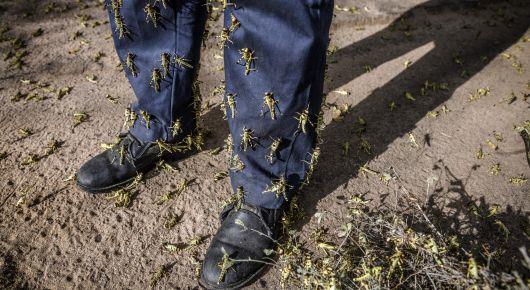FAO and Japan continue fighting locust in Central Asia

The Food and Agriculture Organization of the United Nations (FAO), the Government of Japan, the Japan International Cooperation Agency, and the Ministry of Agriculture of the Republic of Tajikistan will continue to collaborate in the second phase of a regional project to enhance locust management in Tajikistan.
The agreement of the project for improved locust management was signed today by Takayuki Miyashita, Ambassador Extraordinary and Plenipotentiary of Japan, Oleg Guchgeldiyev, FAO Representative, and Tanabe Hideki, Chief Representative of the Japan International Cooperation Agency.
This five-year regional effort with a budget of USD 7.23 million will cover all Central Asian countries, including Kazakhstan, Kyrgyzstan, Tajikistan, Turkmenistan and Uzbekistan, as well as Afghanistan to fight against locust.
The overall aim is to strengthen food security and rural livelihoods by preventing and limiting locust threats and damages to crops and rangelands with respect to human health and the environment. As a result, the project will help reduce poverty and promote economic opportunities in the whole region through agricultural development and, ultimately, economic growth.
“This year, due to the locust swarms, agriculture in many countries of the world suffers enormous damage; this region also cannot escape the threat of locust,” said Takayuki Miyashita during the ceremony. “The locust swarms have already reached neighboring India and Pakistan. It is important to take necessary measures and coordinate action in the region as soon as possible to prevent the locust spread. The Japanese government decided to provide timely assistance to Central Asia, whose agriculture is threatened by locust infestations.”
“I sincerely hope that we will be able to start this project as soon as possible and protect the agriculture of these five countries from the locust, and as a result, this region will continue to develop,” Miyashita added.
“For the last years, locust is becoming growing problem in the Central Asian region. While there is no significant damage reported so far, the locust population visibly increased, especially in Tajikistan, this year. This threatens the agricultural production and livelihoods of farmers, as well as country’s food security, and requires close monitoring of locust distribution and timely treatment to prevent losses,” emphasized FAO Representative in Tajikistan, Oleg Guchgeldiyev.
Rural populations living in locust-affected areas will benefit from the activities as better prevention of outbreaks and upsurges and, consequently, reduced damage to crops and rangelands, ensures better food security for them. The project will also help national locust management authorities, whose institutional, technical, and human capacities will be strengthened at both national and regional levels.
“Through the implementation of the first phase of the project, the cooperation among three participating countries, Tajikistan, Kyrgyzstan, and Afghanistan, was strengthened. The locusts do not care about borders which human being drew, they can move beyond the border so easily. Having three more countries, Kazakhstan, Turkmenistan, and Uzbekistan, will be greatly contributing not only to locust control, but also further strengthening ties among them,” said Tanabe Hideki. “JICA will further contribute to the agricultural sector, such as development of market-oriented agricultural management, as the sector is one of the most important industries in the country,” added Tanabe Hideki.
Traditional locust habitats and breeding areas often span national borders, meaning that locusts frequently cross countries' political boundaries. In this regard, the project will strengthen regional cooperation among countries, which is vital for the successful management of transboundary plant pests such as locusts. Continuous and timely exchange of information between neighboring countries and partners, as well as environmentally friendly controls, are important in this regard.
28 July 2020, Dushanbe, Tajikistan
